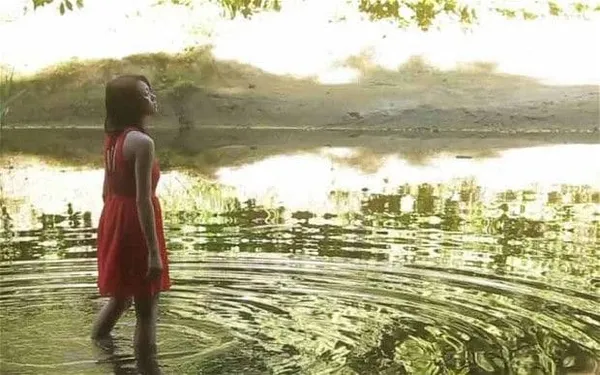Eye For Film >> Movies >> Au Revoir L'Été (2013) Film Review
Au Revoir L'Été
Reviewed by: Andrew Robertson

The core of the film is simple, but Hotori No Sakuko or 'centre of the world' or Au Revoir L'Ete or 'goodbye summer' or 'around Sakuko' is not. It leaves an overwhelming sense of place and time, as ably recalled as by some ennobled romantic larking on about daffodils.
I saw Au Revoir L'Ete at the Edinburgh Film Festival, on the kind of warm June day that makes film-going difficult, the soft summer sun that invites ice-cream and indolence instead of a troglodytic trudge from theatre to theatre. I write this perched in the window of a seaside cottage on a different part of the North Sea, connected to the internet not by reliable hybrid fiber-coaxial but by a mobile phone parlously dangling from the end of a bed. I do this not least because of a commitment to mood, a synaesthetic evocation of the spirit of holiday that infuses Hoji Fukada's film.

Fukada said in Q&A that he "wanted to make a vacation film... but in Japan [people] don't have that kind of vacation". Set and shot in a small town on the outskirts of Tokyo it has those holiday places - a relative's house, a restaurant, boys to talk to, a love hotel... Yet though there is drama the abiding sense is one of a gentle progress, an unfolding as of leaves, shadows dappled sliding slowly afternoonwards.
This is, for want of a better term, also a 'festival film'. Call it a genre akin to the 'literary novel' (and there are several literary elements), a way of making film for those who know about the making of film - nods, winks, even a cameo from EIFF director Chris Fujiwara. It is shot in something that approximates 4:3, "standard", a format that Fukuda describes as "a little narrower than a standard frame". When asked by its Festival audience why he had chosen the format, he said, via translator - "first, really like the size", and further explained that it was in part informed by his experiences as "a teenager watching films from before the 1960s, like Chaplin, Buster Keaton, in order to show the human body... to get the whole entire body", that in previous films shot in 16:9 "there's empty space", and now he wished he could "shoot [them] again in standard size".
That evocation of his own adolescent experience informs his film, aided by a performance from Fumi Nikaido as Sukako that led to her being described as "a mature mind in an immature body", a description that helps her in a film that is about a coming of age for a young lady but asks also "what is an adult?", a realisation made by someone who "exists in the boundary [between child and adult]" that she is "not the main part of the story". This led to a further discussion of the name of the film, which is summarised above - translated titles are a particular bugbear of mine, but there's something sweet, something arch, about translating to French instead.
That story led to a diagram in my notes that was abandoned as the plot unfolded, not because it was complicated but because it has the fuzziness of the real, the ravelling of strings connected by proximity if not causality. There's an awkwardness here, a gaucheness that recalls puberty, a deliberate and sharp reflection of an age characterised by indecision and clumsiness. There are quirks, but it is hard to determine what is local to the town, what is local to the country, what is local to the age of the participants. In the end it leaves an impression, not quite a haunting, but not quite a memory - a sense of place and time and self that is like a blush on an arm, the faded corner of a postcard. The sun has gone behind the buildings and the gulls have quieted, and in the sky that was orange there is now grey. To recall at leisure is a privilege, and to see Au Revoir L'Ete is to anticipate it, to be transported, to holiday and grow.
Reviewed on: 22 Apr 2015
















